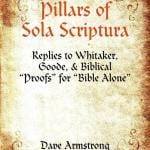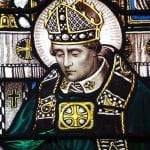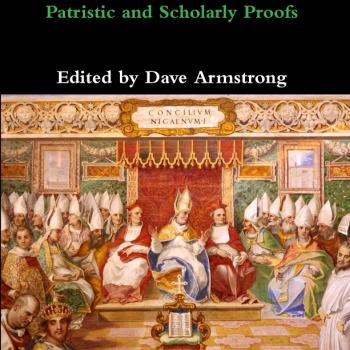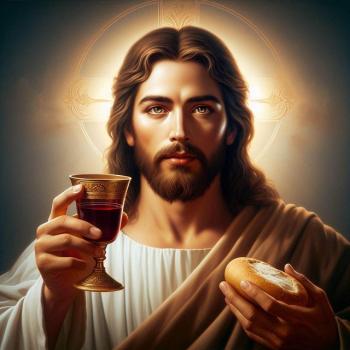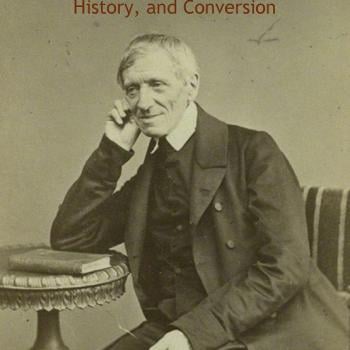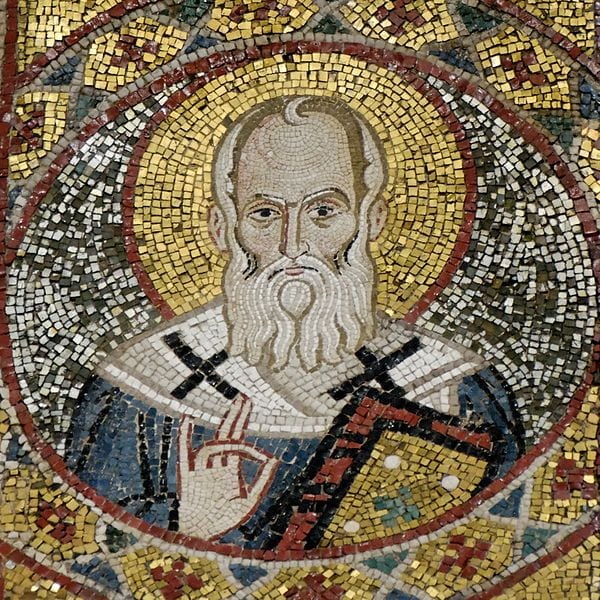
Protestant anti-Catholic polemicists David T. King and William Webster are the editors of a three-volume series, entitled, Holy Scripture: The Ground and Pillar of Our Faith (self-published by Webster’s outfit, Christian Resources Inc. [Battle Ground, Washington] in 2001). I’m most interested in Volume III: subtitled, “The Writings of the Church Fathers Affirming the Reformation Principle of Sola Scriptura” (edited by both Webster and King). In the Introduction to Vol. III (p. 9) they make the fantastically absurd, demonstrably false assertion:
[T]he Church fathers . . . universally taught sola Scriptura in the fullest sense of the term embracing both the material and formal sufficiency of Scripture.
The definition of sola Scriptura, according to three of the most able and articulate Protestant defenders of it in our time, is the following:
[T]he Bible alone is the infallible written authority for faith and morals (Norman Geisler)
Scripture . . . is the only inspired and inherently infallible norm, and therefore Scripture is the only final authoritative norm. (Keith A. Mathison)
The doctrine of sola scriptura . . . is that the Scriptures alone are sufficient to function as the regula fidei, the infallible rule of faith for the Church. (James R. White) [my bolding; see the sources for these quotations and also a fuller explication by each man]
Such a definition entails also understanding what sola Scriptura is not. It logically rules out tradition, the Church, ecumenical councils, bishops, popes, or appeal to apostolic succession as infallibly and finally authoritative. Only the Bible is that. Therefore, if any Church father believes that any of these are infallible or a final authority, then he (by the same token) does not and indeed cannot believe in sola Scriptura. I didn’t “set the rules”. Protestants have by defining sola Scriptura as they do. Thus, they have to live with their own definition and unbiblical rule of faith.
I shall be examining (in this series of papers) several Church fathers that Webster and King bring up, and documenting that they rejected sola Scriptura. I’ve already done this documentation (generally speaking) with regard to Augustine, Athanasius, John Chrysostom, Jerome, Ambrose, Irenaeus, Justin Martyr, Clement of Alexandria, Hippolytus, Dionysius, Basil the Great, Cyril of Jerusalem, Theodoret, Gregory of Nyssa, Tertullian, Origen, Epiphanius, Lactantius, Cyprian, Papias, and John Damascene.
All citations are from Volume III unless otherwise indicated.
*****
We however, following the Divine Scriptures, and removing out of the way of the blind the stumbling blocks contained in them, will cling to salvation . . . (St. Gregory Nazianzen, Oration 42, section 18; cited on p. 80)
Who is the man, whose heart has never been made to burn, as the Scriptures have been opened to him, with the pure words of God which have been tried in a furnace; who has not, by a triple inscription of them upon the breadth of his heart, attained the mind of Christ; nor been admitted to the treasures which to most men remain hidden, secret, and dark, to gaze upon the riches therein? and become able to enrich others, comparing spiritual things with spiritual. (Oration 2, section 96; cited on p. 263)
St. Gregory Nazianzen [or “of Nazianzus”] (c. 330-c. 389) is one of the “Three Holy Hierarchs” of Eastern Christian Tradition, and is a Doctor of the Catholic Church as well.
What have Webster and King proven by these two citations? Absolutely nothing . . . This is the entirety of their “proof” for St. Gregory. Do these two statements prove that he accepted the Bible as the only and final infallible authority in all matters (i.e., sola Scriptura)? Not at all. St. Gregory made a practice of “following” the Bible and knew that Scripture contained “the pure words of God” and the power and “treasures” to enable men to attain “the mind of God”: as all Christians do (all alike believing it is uniquely inspired revelation). That tells us nothing whatsoever about his view of the rule of faith. What he writes is completely consistent with Catholic or Orthodox belief (or Protestant).
Now we shall see what St. Gregory said about other related things, which show that he did not believe in sola Scriptura, and sadly observe that Webster and King deliberately ignored other relevant information (which contradicts their agenda), in their rush to engage in dishonest selective citation only. A half-truth is no better than a lie. This is why people testifying in court take an oath to tell the “whole truth.”
St. Gregory believed in the infallibility of ecumenical councils (which is anathema to sola Scriptura):
I never have and never can honour anything above the Nicene Faith, that of the Holy Fathers who met there to destroy the Arian heresy; but am, and by God’s help ever will be, of that faith; completing in detail that which was incompletely said by them concerning the Holy Ghost; for that question had not then been mooted, namely, that we are to believe that the Father, Son, and Holy Ghost are of one Godhead, thus confessing the Spirit also to be God. Receive then to communion those who think and teach thus, as I also do; but those who are otherwise minded refuse, and hold them as strangers to God and the Catholic Church. (Letter #102: Second to Cledonius the Priest, Against Apollinarius; NPNF2-7)
And therefore, first in the holy Synod of Nicaea, the gathering of the three hundred and eighteen chosen men, united by the Holy Ghost, as far as in him lay, he [St. Athanasius] stayed the disease. (Oration 21, section 14, in NPNF2,VII:273)
He rejected (with biting sarcasm) the perspicuity or apparent clearness of Scripture, and its self-interpreting nature (aspects that Webster and King devote 95 pages to, as key tenets of sola Scriptura):
[T]he wiser of the Hebrews tell us that there was of old among the Hebrews a most excellent and praiseworthy law, that every age was not entrusted with the whole of Scripture, inasmuch as this would not be the more profitable course, since the whole of it is not at once intelligible to everyone, and its more recondite parts would, by their apparent meaning, do a very great injury to most people. Some portions therefore, whose exterior is unexceptionable, are from the first permitted and common to all; while others are only entrusted to those who have attained their twenty-fifth year, viz., such as hide their mystical beauty under a mean-looking cloak, to be the reward of diligence and an illustrious life; flashing forth and presenting itself only to those whose mind has been purified, on the ground that this age alone can be superior to the body, and properly rise from the letter to the spirit. Among us, however, there is no boundary line between giving and receiving instruction, like the stones of old between the tribes within and beyond the Jordan: nor is a certain part entrusted to some, another to others; nor any rule for degrees of experience; but the matter has been so disturbed and thrown into confusion, that most of us, not to say all, almost before we have lost our childish curls and lisp, before we have entered the house of God, before we know even the names of the Sacred Books, before we have learnt the character and authors of the Old and New Testaments: . . . if, I say, we have furnished ourselves with two or three expressions of pious authors, and that by hearsay, not by study; if we have had a brief experience of David, or clad ourselves properly in a cloaklet, or are wearing at least a philosopher’s girdle, or have girt about us some form and appearance of piety—phew! how we take the chair and show our spirit! Samuel was holy even in his swaddling-clothes: we are at once wise teachers, of high estimation in Divine things, the first of scribes and lawyers; we ordain ourselves men of heaven and seek to be called Rabbi by men; the letter is nowhere, everything is to be understood spiritually, . . . This is the case with the better and more simple of us: what of those who are more spiritual and noble? . . . we may rightly, in my opinion, apply to them the saying of Solomon: There is an evil which I have seen under the sun, a man wise in his own conceit; and a still greater evil is to charge with the instruction of others a man who is not even aware of his own ignorance. (Oration 2: Exposition on the Character of the Priestly Office, sections 47-50; NPNF2-7)
Imagine Pastor King teaching his congregation that certain portions of Scripture can’t be read till one is 25 years old! He can’t even comprehend such a thing. But this was common in the Church fathers and the early Church: a gradual introduction of children and catechumens to the mysteries of the faith.
When St. Gregory rejected reincarnation, he did so not based on only the Bible, but also “the traditions of the Church”:
I fear lest some monstrous reasoning may come in, as of the soul having lived elsewhere, and then having been bound to this body, and that it is from that other life that some receive the gift of prophecy, and others are condemned, namely, those who lived badly. But since such a conception is too absurd, and contrary to the traditions of the Church . . . (Oration 37, section 15; NPNF2-7)
Protestants don’t talk like that, or think like that. They would always appeal to the biblical teaching. Of course Catholics do that, too (my own apologetics apostolate greatly emphasizes this very thing). But the difference is that we acknowledge other infallible authority (apostolic tradition and Church authority) besides the Bible: in perfect harmony with it.
St. Gregory believed in apostolic tradition and apostolic succession (dramatically equating such tradition with “the oracles of God”):
My sheep hear my voice, which I heard from the oracles of God, which I have been taught by the Holy Fathers, which I have taught alike on all occasions, . . . (Oration 33, section 15)
He [St. Athanasius] is led up to the throne of Saint Mark, to succeed him in piety, no less than in office; in the latter indeed at a great distance from him, in the former, which is the genuine right of succession, following him closely. For unity in doctrine deserves unity in office; and a rival teacher sets up a rival throne; the one is a successor in reality, the other but in name. For it is not the intruder, but he whose rights are intruded upon, who is the successor, not the lawbreaker, but the lawfully appointed, not the man of contrary opinions, but the man of the same faith; . . . (Oration 21, section 8, in NPNF2, VII:271)
For if the faith began thirty years ago, when nearly four hundred years had passed since Christ was manifested, vain all that time will have been our Gospel, and vain our faith; in vain will the Martyrs have borne their witness, and in vain have so many and so great Prelates presided over the people; and Grace is a matter of metres and not of the faith. (Letter #102: Second to Cledonius the Priest, Against Apollinarius; NPNF2-7)
He believed in authoritative oral teaching:
[O]ur faith has been proclaimed, both in writing and without writing, here and in distant parts, in times of danger and of safety, . . . (Letter #101, First to Cledonius the Priest, Against Apollinarius; NPNF2-7)
He believed that a pope (Damasus: r. 366-384) could utter an anathema for heresy:
But, that they may not accuse us of having once accepted but of now repudiating the faith of their beloved Vitalius which he handed in in writing at the request of the blessed Bishop Damasus of Rome, I will give a short explanation on this point also. . . . Since then these expressions, rightly understood, make for orthodoxy, but wrongly interpreted are heretical, what is there to be surprised at if we received the words of Vitalius in the more orthodox sense; our desire that they should be so meant persuading us, though others are angry at the intention of his writings? This is, I think, the reason why Damasus himself, having been subsequently better informed, and at the same time learning that they hold by their former explanations, excommunicated them and overturned their written confession of faith with an Anathema; . . . (Letter #102: Second to Cledonius the Priest, Against Apollinarius; NPNF2-7)
He even (I add this as a “bonus” at no extra charge) makes Marian doctrines one of the the rationales for deciding if a person knows God or not (exactly what Protestants loathe when language like this is connected to the Blessed Virgin Mary’s Immaculate Conception or Assumption):
If anyone does not believe that Holy Mary is the Mother of God, he is severed from the Godhead. If anyone should assert that He passed through the Virgin as through a channel, and was not at once divinely and humanly formed in her (divinely, because without the intervention of a man; humanly, because in accordance with the laws of gestation), he is in like manner godless. If any assert that the Manhood was formed and afterward was clothed with the Godhead, he too is to be condemned. (Letter #101, First to Cledonius the Priest, Against Apollinarius; NPNF2-7)
Therefore, St. Gregory Nazianzen assuredly did not believe in sola Scriptura.
***
Photo credit: St. Gregory Nazianzen: 12th-century mosaic: from Santa Maria dell’Ammiraglio in Palermo, Sicily. Photographed by Jastrow (8-27-08) [Wikimedia Commons / Creative Commons Attribution 2.5 Generic license]
***
Summary: St. Gregory Nazianzen: one of the “Three Holy Hierarchs” of Eastern Christianity, & Doctor of the Catholic Church, did not believe in sola Scriptura, as William Webster & David T. King falsely claim.
***


